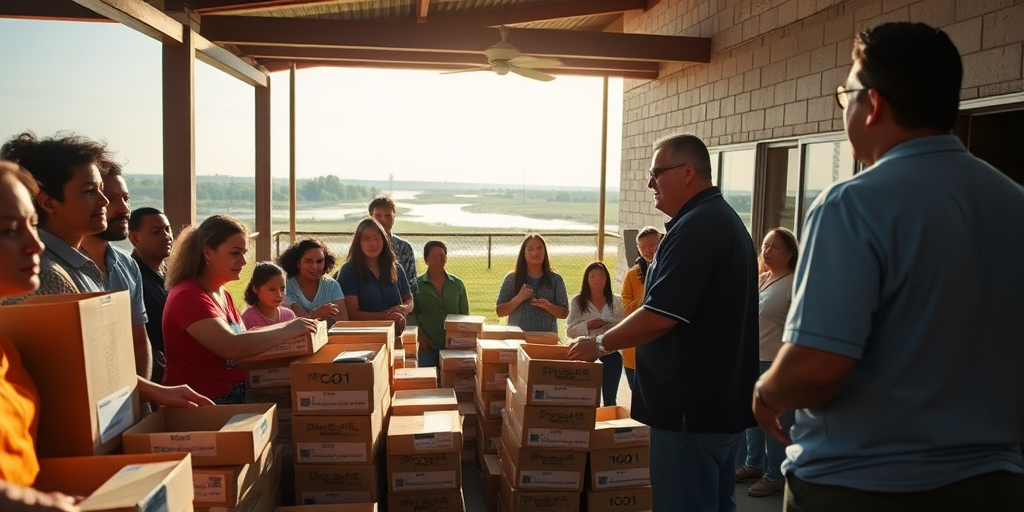Protests Erupt in Harlingen Against Trump’s Immigration Policies
Amid rising tensions surrounding immigration policies, a group gathered in Harlingen to voice their opposition to President Trump’s approach. The protest, drawing over 20 people, reflects local frustrations and aligns with nationwide unrest concerning the administration’s stance on immigration enforcement and deportations.
Community Expresses Concerns
Harlingen residents joined the wave of protests unfolding across the Rio Grande Valley and the nation, opposing the Trump administration’s policy directives that emphasize increased Immigration and Customs Enforcement (ICE) arrests. In recent weeks, the administration has directed ICE agents to arrest a specific daily quota of undocumented individuals, sparking anxiety and activism in communities like the Valley.
Protestors, such as Harlingen resident Sarahi De La Garza, expressed their dismay over the potential familial disruptions caused by heightened deportation efforts. “All these people that are going through this, it’s just very sad that kids are being left alone,” De La Garza remarked amidst the demonstration, where participants brandished the Mexican flag and wielded signs advocating for immigrant rights.
Legal Guidance in Uncertain Times
The protestors are not alone in seeking ways to navigate the increasingly aggressive immigration policies. Local law offices, including that of Harlingen immigration attorney Susana Silva, have reported a surge in calls from concerned individuals since the policy’s announcement. “We’re fielding at least 60 calls daily,” Silva noted. “People want to know if ICE has rights to detain them, and what their own rights are if approached.”
Silva is actively urging community members to be informed about their legal rights and the potential implications of compliance or defiance in encounters with ICE. “You have a right to remain silent and exert it, and a right to be represented by an attorney,” she stated, stressing the importance of not signing any documents or opening doors to ICE agents without an official warrant.
The Broader Impact on Rio Grande Valley
The Rio Grande Valley, with its substantial immigrant population, faces unique challenges. The Valley’s economic and cultural landscape is deeply intertwined with immigration, making the current climate of intensified enforcement particularly relevant. The Valley often acts as a microcosm of the broader national debate on immigration, where shifts in policies can radically alter daily life for its residents.
These policy changes also resonate due to past incidents involving high-profile individuals, such as the recent arrest of famed Mexican boxer Julio César Chávez Jr. by ICE. Chávez’s detention, coupled with allegations of cartel connections, has only fueled the conversation about the reach and implications of aggressive immigration enforcement, drawing international scrutiny to the RGV.
Historical Context and Current Connections
Recent protests harken back to previous instances of activism within the Valley addressing immigration issues. The RGV has a rich history of advocacy, whether through legal aid or community organizing, underscoring long-standing concerns over how federal policies impact local lives.
The current protest aligns with past efforts, such as those responded to changes in Deferred Action for Childhood Arrivals (DACA) or family separations at the border. With each policy shift under the Trump administration, the Valley has witnessed both the hardships faced by immigrant families and the resilience of community networks supporting them.
Looking Ahead
Looking forward, the approach to immigration policy by federal authorities and corresponding reactions by local communities remain dynamic. Valley residents, like those in Harlingen, continue to engage with these issues through protests and by seeking legal counsel to equip themselves against the ramifications of evolving regulations.
Despite the palpable sense of uncertainty, community leaders stress the importance of awareness and understanding. Fr. Miguel Rodriguez of Brownsville’s Catholic Diocese reiterated the need for solidarity in these times. “Our message in moments like these is one of unity and support,” he expressed, echoing the call for communities to hold fast to their values in advocating for justice and compassion.
Support Networks and Resources
For those seeking assistance or more information, local organizations such as the South Texas Immigration Council offer workshops and free legal advice sessions to guide individuals through their rights and options. Additionally, immigration newsletters and hotline services remain critical resources for the Valley, providing timely updates and legal counsel.
In closing, while the protests in Harlingen spotlight local dissent over federal immigration policies, they also reiterate the strength and unity of Valley residents. As this story develops, the commitment to community interest and local impact remains central, reflecting the resilience intrinsic to South Texas.







